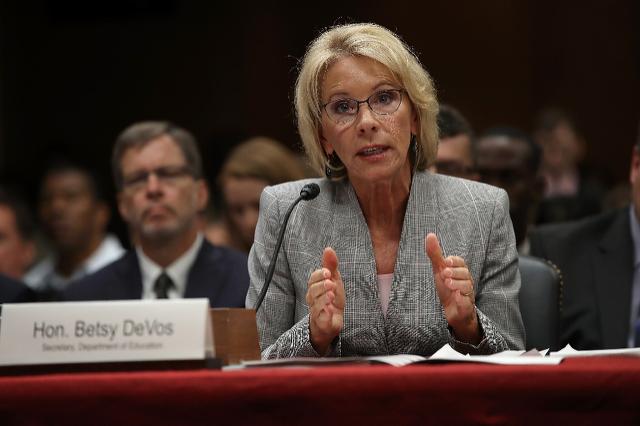Trump administration eyes easing student debt protections
Pakistan Press Club –Washington.
Thousands of students who ran up unpayable debts at for-profit schools are anxiously waiting to see if US President Donald Trump’s administration does away with anti-fraud protections put in place by his predecessor Barack Obama.
Some 95,000 cases of former students seeking forgiveness of their debt have been put on hold by the Department of Education, now led by Betsy DeVos, an ardent advocate of for-profit, post-secondary schools.
Most of the cases now on hold involve former students at two giants of the for-profit college industry — Corinthian Colleges and ITT Tech, which closed in 2015 and 2016.
Students claim they were lured into enrolling in training programs by promises of jobs and diplomas that later proved worthless.
“They laughed at my diploma,” said Danielle Adorno, describing the reaction of prospective employers.
The 30-year-old New Yorker’s case is fairly typical.
She wanted to become a baker so she borrowed $25,000 to pursue “culinary studies” at the Art Institute, a private group that ran several schools in the United States, including the one in New York that she attended.
As she tells it, admissions officers used “deflection tactics” to persuade her to enroll, withholding information about graduation rates and how many graduates went on to find jobs.
After nine months of training, Adorno is disillusioned, and has asked the Education Department to forgive her debt.
- Naivete –
Adorno admits to a certain naivete in not having looked into the institute’s reputation before enrolling.
But she feels she was lied to about the quality of the school and its program, and points to the fact that it went out of business as evidence of its shoddy quality.
Adorno, like others in her situation, cannot sue the for-profits under the terms of contracts they signed with the schools. Instead, she has asked the Education Department to forgive her debt.
A rule change made in 2016 under former president Barack Obama allows the Education Department to forgive a student’s debt, and then sue the for-profit to recover the money.
The situation came to a head in 2015, when Corinthian Colleges filed for bankruptcy, after receiving a fine from California of $1.1 billion, and a federal one of $30 million for making false and deceptive statements.

At issue now is whether the rule change will be reversed or modified under DeVos, who has ordered a review and frozen the loan forgiveness process.
No requests for student loan forgiveness has been approved since January. The Education Department says it is overloaded with a backlog.
Career Education Colleges and Universities (CECU), an association of for-profit post-secondary schools, contends its members were the target of an ideological, agenda driven campaign during the administration of Barack Obama.
“The Department of Education was a prosecutor, a judge and a jury, it was unfair,” CECU’s president Steve Gunderson told AFP.
“We provide a very good niche in the sector of post-secondary education.”
- Unmet promises –
Democratic Senator Richard Durbin disputes that criticism.
“The sad reality is the education is not good in most of these schools so students who mistakenly sign up for these schools go deeply in debt and find themselves unable to finish school or if they finish, unable to get a good job,” Durbin said.
“If the school promised you would have a job, and you did not get a job, they defrauded you, they misled you.”
Clare McCann, an expert on higher education at New America, a public policy think tank, says the for-profit schools have a built-in incentive to maximize their profits at their students’ expense.
And yet, she said, “many for-profit colleges get almost 90 percent of their money from federal grants and loans.”
“Taxpayers spend $130 billion every year on these schools,” she said.
McCann, who was involved in the 2016 rule changes, believes the revised rules will be ready in November 2018.
Adorno has found a job as a secretary and obtained a temporary suspension of her payments. But she no longer has access to credit.



